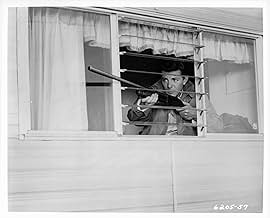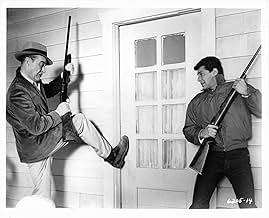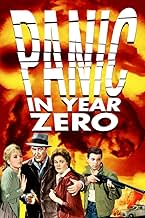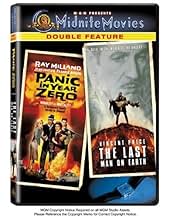Ajouter une intrigue dans votre langueA family leaves Los Angeles for a camping trip just before hydrogen bombs destroy the city. In the midst of the chaos, the father must fight to keep his family alive along the highway.A family leaves Los Angeles for a camping trip just before hydrogen bombs destroy the city. In the midst of the chaos, the father must fight to keep his family alive along the highway.A family leaves Los Angeles for a camping trip just before hydrogen bombs destroy the city. In the midst of the chaos, the father must fight to keep his family alive along the highway.
Neil Burstyn
- Andy
- (as Neil Nephew)
Chet Brandenburg
- Roadside Diner Customer
- (non crédité)
Ralph Clanton
- Radio Announcer
- (voix)
- (non crédité)
Kelton Crawford
- Looter
- (non crédité)
Histoire
Le saviez-vous
- AnecdotesThe Saddle Peak Lodge featured in the movie is an actual restaurant still open today. It is located in Calabasas, California, USA.
- GaffesWhen Mr. Baldwin throws a pail of gasoline across the busy highway to make the traffic stop so they could get across, the resultant fire is much larger and more prolonged than the small amount shown could have produced.
- Citations
Dr. Powell Strong: Now, you stay on the back roads. And you keep your gun handy. Our country is still full of thieving, murdering patriots.
- Crédits fousOther than the title, all credits are at the end of the movie.
- ConnexionsFeatured in Aweful Movies with Deadly Earnest: Panic in the Year Zero (1969)
Commentaire à la une
This is a genuinely enjoyable example of a "post-nuclear holocaust survival
film." It may seem a bit campy by modern standards, but is actually well thought- out and acted. The early 60's were an era in which it seemed possible to
contemplate a nuclear war that broke down civilization's normal function
withOUT reducing the entire countryside to rubble. A man takes his family out into the country to escape the chaos, still clinging to the hope that normalcy and order will soon return. His wife is horrified at his newfound ruthlessness, and the kids seem willing to go with the new rules of the jungle.
Ray Milland was at one time an acclaimed actor, but his academy award for
"Lost Weekend" seems to have cursed his career. Now regarded as a "serious"
actor, suited only for "down" roles, he wasn't given much chance to work in the more "up" big-studio roles of the fifties. By the time he wound up at AIP, he was little more than a "has-been" to the public. But he retained real talent, as his directing and starring in this and other Sci-fi pictures of the period shows. When given a free hand, as in "Panic In Year Zero!" he took on challenges others
would have shied away from and showed that he still had a lot to offer. Sadly, big time directors continued to ignore him and the end of his life was defined by roles in "Frogs" and "The Thing With Two Heads" - films far worse than anything with Corman's name on them.
"Panic in Year Zero!" displays the basic conflict of compromise: Ray's character must compromise his beliefs and code of behavior in order to preserve what he cares for. His constant conflict with his wife displays the conflict between
differing ideas of what needs to be preserved - to her, saving the family by acts of savagery is unacceptable, and the only way to preserve civilization is to apply its rules in every situation. The ending seems to redeem Ray, but the fact is that the questions raised are answered by each viewer in the course of the film in his or her own way. Events in the film are not one-sided, and Ray's relation to the hardware store owner calls into question his position and correctness: perhaps by allying himself earlier with other decent people trying to survive, Ray could have saved his family from some of what it endures.
As we now re-acclimate ourselves to an era in which the possibility of "limited" nuclear attack (from national or independent terrorist groups) seems more likely than Mutual Assured Destruction, it is possible that films such as "Panic in Year Zero!" offer us important ethical problems. Problems we hope never to have to solve in real life, but which the screen offers a means to wrestle with in a safe environment.
film." It may seem a bit campy by modern standards, but is actually well thought- out and acted. The early 60's were an era in which it seemed possible to
contemplate a nuclear war that broke down civilization's normal function
withOUT reducing the entire countryside to rubble. A man takes his family out into the country to escape the chaos, still clinging to the hope that normalcy and order will soon return. His wife is horrified at his newfound ruthlessness, and the kids seem willing to go with the new rules of the jungle.
Ray Milland was at one time an acclaimed actor, but his academy award for
"Lost Weekend" seems to have cursed his career. Now regarded as a "serious"
actor, suited only for "down" roles, he wasn't given much chance to work in the more "up" big-studio roles of the fifties. By the time he wound up at AIP, he was little more than a "has-been" to the public. But he retained real talent, as his directing and starring in this and other Sci-fi pictures of the period shows. When given a free hand, as in "Panic In Year Zero!" he took on challenges others
would have shied away from and showed that he still had a lot to offer. Sadly, big time directors continued to ignore him and the end of his life was defined by roles in "Frogs" and "The Thing With Two Heads" - films far worse than anything with Corman's name on them.
"Panic in Year Zero!" displays the basic conflict of compromise: Ray's character must compromise his beliefs and code of behavior in order to preserve what he cares for. His constant conflict with his wife displays the conflict between
differing ideas of what needs to be preserved - to her, saving the family by acts of savagery is unacceptable, and the only way to preserve civilization is to apply its rules in every situation. The ending seems to redeem Ray, but the fact is that the questions raised are answered by each viewer in the course of the film in his or her own way. Events in the film are not one-sided, and Ray's relation to the hardware store owner calls into question his position and correctness: perhaps by allying himself earlier with other decent people trying to survive, Ray could have saved his family from some of what it endures.
As we now re-acclimate ourselves to an era in which the possibility of "limited" nuclear attack (from national or independent terrorist groups) seems more likely than Mutual Assured Destruction, it is possible that films such as "Panic in Year Zero!" offer us important ethical problems. Problems we hope never to have to solve in real life, but which the screen offers a means to wrestle with in a safe environment.
Meilleurs choix
Connectez-vous pour évaluer et suivre la liste de favoris afin de recevoir des recommandations personnalisées
- How long is Panic in Year Zero!?Alimenté par Alexa
Détails
- Date de sortie
- Pays d’origine
- Langue
- Aussi connu sous le nom de
- Panic in Year Zero!
- Lieux de tournage
- Société de production
- Voir plus de crédits d'entreprise sur IMDbPro
Box-office
- Budget
- 225 000 $US (estimé)
- Durée1 heure 33 minutes
- Couleur
- Mixage
- Rapport de forme
- 2.35 : 1
Contribuer à cette page
Suggérer une modification ou ajouter du contenu manquant

Lacune principale
By what name was Panique année zéro (1962) officially released in India in English?
Répondre



































